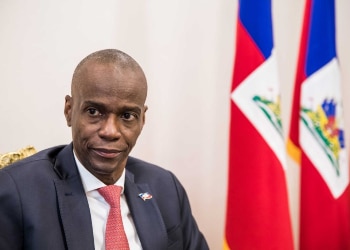The president of Haiti is urging citizens to work together with the Caribbean nation’s police force to help quell an alarming uptick in gang kidnappings for ransom, highlighting the state’s inability to weather the fallout from backing increasingly powerful criminal actors.
“I don’t have a problem carrying this weight on my back … but I need your help, I need the support of the population. I need a marriage with the police and the population to allow us today to grab the thugs by the neck,” said President Jovenel Moïse in a live address January 25, recognizing the severity of the problem
The surprise call for help came just hours after the latest kidnapping case in the country. Earlier that day, a 10-year-old boy was snatched just outside the entrance to his school in the city of Carrefour, which sits to the southwest of the capital Port-au-Prince. The boy was released later the same day, according to local newspaper Le Nouvelliste.
SEE ALSO: Coverage of Haiti
That case is one part of a broader upsurge in kidnappings in Haiti. Authorities went from recording just 39 cases in 2019 to nearly 200 last year, Vice News reported, a more than 400 percent increase. Unofficially, however, Le Nouvelliste estimated that there were 160 kidnapping cases every month between January and August 2020 alone.
Amid economic hardship and ongoing political unrest, kidnapping in Haiti has gone from a crime that primarily targeted wealthy individuals to one where armed gangs now prey on everyone from schoolchildren to market vendors and even church leaders, according to the Miami Herald.
While kidnappers previously went to great lengths to hide their victims, they now often tell relatives where hostages are located because “they know that police won’t go into gang-controlled slums,” the Miami Herald reported.
InSight Crime Analysis
The outbreak of kidnappings in Haiti is directly related to the heavily armed gangs that operate with impunity due in large part to the government support provided to them in exchange for political favors.
This crisis has been months, if not years, in the making. In early 2020, Marie Yolène Gilles, a leading human rights activist at the Fondasyon Je Klere (FJKL) watchdog group, told the United Nations Security Council that “freedom of movement is not guaranteed” in Haiti.
“As armed-gang fiefdoms have become inaccessible to the police, the gangs have taken full control of the civilian population living in those areas and of those they have kidnapped,” Gilles said.
Across the entire country, Giles said more than 150 armed gangs are active. Some of them benefit from protection agreements brokered with government officials who, “in an attempt to survive politically, often rely on gangs and use gang-warfare strategies,” according to Giles.
Indeed, several human rights groups allege that the “G9 an Fanmi,” (G9 and Family), a gang alliance brokered last year between at least nine gangs in Port-au-Prince, has seemingly benefited from protection from President Moïse. The architect behind the alliance, Jimmy Chérizier, alias “Barbecue,” is a former Haitian police officer.
SEE ALSO: Is Haiti’s G9 Gang Alliance a Ticking Time Bomb?
The quid-pro-quo arrangement between the G9 and government officials — whereby gangs keep violence down in areas they control while silencing the opposition and securing political support in exchange for state protection — speaks to the longstanding ties between political actors and criminal leaders in the country.
State security forces have also been implicated in crimes against civilians. In some kidnapping cases, victims have reported being taken by individuals wearing police uniforms or driving police vehicles, according to the Miami Herald’s reporting.
“Crimes are being committed with the support, at least tacit, of the government, and the perpetrators enjoy official impunity,” Giles told the UN Security Council.

